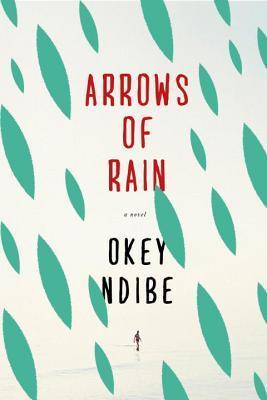
Arrows of Rain
By Okey Ndibe
Soho Press, 304 pp., $16
A year ago, when I reviewed Okey Ndibe’s fiercely ironic “Foreign Gods, Inc.,” I was under the mistaken belief that it was his first novel. Turns out that the earlier “Arrows of Rain” was published in 2000 through the Heinemann “African Writers Series.”
Now, after the success of “Foreign Gods, Inc.,” Soho Press is reprinting “Arrows of Rain” (304 pp., $16) for a wider audience.
“Foreign Gods, Inc.” left one with a premonitory impatience for more; it signaled that Ndibe might well be a new and dangerously eloquent voice, a gifted storyteller in the tradition of Chinua Achebe, Ngugi wa Thiong’o, Wole Soyinka and other African writers who have set Everyman and Everywoman narratives against the vast backdrops of colonial and modern historical machineries, power and fate.
“Arrows of Rain” doesn’t quite confirm the estimate of such high status, but it provides mounting evidence of Ndibe’s talent.
Set in a fictionalized Nigeria, the novel begins with the death of a prostitute, and a subversive accusation. The last person to speak to her while she was still alive was Bukuru, “the madman.”
When questioned, he responds with a seemingly outrageous indictment: that the woman was raped by members of the armed forces; that the government has been actively covering up cases of rape and murder for decades; and that Gen. Isa Palat Bello, who has recently appointed himself President for Life, is also guilty of the rape and murder of a young woman named Iyese 23 years prior.
This is a potent but not uncommon trope – a madman speaking truth to power – and it acquires additional resonance and bite when cast in a neocolonial setting. The outcome of Bukuru’s allegation is predictable: He is held in contempt and charged with the crime himself.
At that point, early in the book, Ndibe switches gears and begins to unravel the pre-story, taking us back to the story of Iyese. This large middle section is narrated by Femi Adero, a young journalist who followed Bukuru’s testimony in court and thereafter conducted extensive interviews with the incarcerated man.
Bukuru’s story recounts not merely government larceny and murder, but by extension, the larger history of a country. The “whitemen came here and threw together all kinds of odds and ends and called it a nation,” one of the characters tells Adero bitterly. “We live in a bastard nation.”
Ndibe and many other African writers are grappling with profound questions of individual and collective identity post-independence, and how to reconcile the displacements of self and culture.
“Today, we’re out of touch with our ancestors, a people who belong neither to the sky nor to the earth,” one character concludes.
“So let me complete your picture of what goes on in our villages. The man in the Rolls Royce flaunts his loot because he believes it is his legitimate spoils. He has not stolen from those he considers his people, but from strangers. The poor people singing his praises don’t believe he has robbed or disinherited them. They admire him because he has made his way in the territory left to us by the whites and has won his fortune.”
“Arrows of Rain” is Greek tragedy; one is standing in ruin, helpless, and only sees more ruin advancing. Those seeking tidy and unilinear tellings of African lives will be frustrated, but Ndibe’s work, because of its shifts in perspective and voice, is perhaps a more honest account.
It serves as a powerful reminder that the imprint of history – its machinations and cultural usurpations, its elevations and denigrations – is not merely on the subsequent chronicle, but on subsequent individual souls as well.
At the end of the book, Bukuru relays his conversation with the woman who was murdered at the novel’s outset. She tells of the beating, the rape she suffered at the hands of soldiers, and then, tears streaming down her face, asks Bukuru, this man who amidst so much violence actually seems to care, “Who are you?”
“I don’t know any more,” he replies. It’s the only possible truthful answer, suggesting both effacement and potential discovery – and suggesting that Ndibe is a writer of courage and complexity, one well worth watching.
Pike is a critic in Cleveland Heights.
FRENCH VERSION


